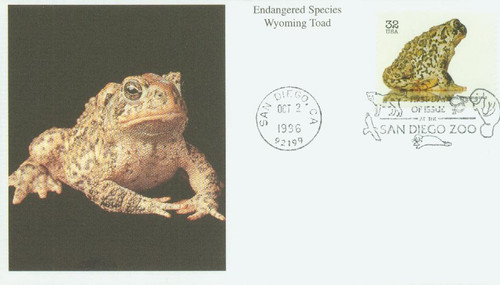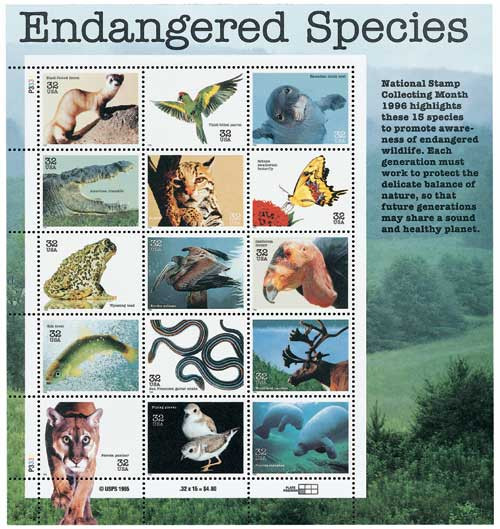
# 3105g - 1996 32c Endangered Species: Wyoming Toad
US #3105g
1996 Wyoming Toad
- Part of set of 15 stamps picturing Endangered Species
- Issued during National Stamp Collecting Month
Stamp Category: Commemorative
Set: Endangered Species
Value: 32¢First-Class mail rate
First Day of Issue: October 2, 1996
First Day City: San Diego, California
Quantity Issued: 14,910,000
Printed by: Ashton-Potter (USA) Ltd.
Printing Method: Lithographed
Format: Panes of 15 (3 across, 5 down) from printing plates of 90 (9 across, 10 down)
Perforations: 11.1 x 11
Why the stamp was issued: The pane of 15 Endangered Species stamps was issued as part of the US Postal Service’s National Stamp Collecting Month. The theme for 1996 was “Collect and Protect.” The USPS hoped these stamps would appeal to children, who would then become lifelong stamp collectors.
About the stamp design: The stamps show photographs of 15 animal species that live in America and re threatened with extinction. The photos were taken by James Balog. The animals chosen for the stamps are from all major geographic areas of the US. The Wyoming toad pictured on the stamp lived at a Fish and Wildlife station in New Mexico.
First Day City: The First Day of Issue ceremony took place at the San Diego Zoo. In 1996, the zoo was celebrating its 80th birthday. The country of Mexico issued its own pane of endangered species stamps on the same day and took part in the First Day of Issue ceremony. (The stamps were not a joint issue.) In addition to honored human guests, two sea lions, an Andean condor, and a North American timber wolf were also in attendance at the celebration.
Unusual fact about the Endangered Species stamps: The 1996 National Stamp Collecting Month was co-sponsored by the US Postal Service and the American Zoo and Aquarium Association.
About the Endangered Species Set: The species shown on the pane of Endangered Species stamps are: Black-footed Ferret, Schaus Swallowtail Butterfly, Brown Pelican, San Francisco Garter Snake, Ocelot, Gila Trout, Hawaiian Monk Seal, Thick-billed Parrot, California Condor, Wyoming Toad, Woodland Caribou, Florida manatee, Florida Panther, Piping Plover, and American Crocodile. All of them are listed on the US Fish and Wildlife Service’s List of Endangered and Threatened Wildlife and Plants.
History this stamp represents: Since the Ice Age, the Wyoming toad has remained isolated around a series of ponds in the Laramie Basin of southeast Wyoming. Measuring just two inches long, it developed into a distinct subspecies with a unique crown on the top of its head.
Fossils suggest that the species could once be found abundantly throughout the area, but by 1986 the population was limited to one small pond. Although counts indicated there were about 200 toads, which is considered to be a fairly good breeding population, scientists realized a severe drought or unseasonably warm or cold winter could wipe out the entire population.
Unsure of the reasons for the toad’s disappearance, conservationists determined a captive-breeding program was the best way to protect the species and prevent its possible extinction. In 1992 a new breeding colony was established at the Hutton Lake National Wildlife Refuge. Healthy captive-bred toads were placed in a caged community at the edge of the refuge where they were able to successfully breed. Now scientists wait to see if sufficient offspring are able to survive predators, harsh weather, and potential problems from inbreeding. Not until there are five or six successful breeding sites will the survival of the species be considered secure.
US #3105g
1996 Wyoming Toad
- Part of set of 15 stamps picturing Endangered Species
- Issued during National Stamp Collecting Month
Stamp Category: Commemorative
Set: Endangered Species
Value: 32¢First-Class mail rate
First Day of Issue: October 2, 1996
First Day City: San Diego, California
Quantity Issued: 14,910,000
Printed by: Ashton-Potter (USA) Ltd.
Printing Method: Lithographed
Format: Panes of 15 (3 across, 5 down) from printing plates of 90 (9 across, 10 down)
Perforations: 11.1 x 11
Why the stamp was issued: The pane of 15 Endangered Species stamps was issued as part of the US Postal Service’s National Stamp Collecting Month. The theme for 1996 was “Collect and Protect.” The USPS hoped these stamps would appeal to children, who would then become lifelong stamp collectors.
About the stamp design: The stamps show photographs of 15 animal species that live in America and re threatened with extinction. The photos were taken by James Balog. The animals chosen for the stamps are from all major geographic areas of the US. The Wyoming toad pictured on the stamp lived at a Fish and Wildlife station in New Mexico.
First Day City: The First Day of Issue ceremony took place at the San Diego Zoo. In 1996, the zoo was celebrating its 80th birthday. The country of Mexico issued its own pane of endangered species stamps on the same day and took part in the First Day of Issue ceremony. (The stamps were not a joint issue.) In addition to honored human guests, two sea lions, an Andean condor, and a North American timber wolf were also in attendance at the celebration.
Unusual fact about the Endangered Species stamps: The 1996 National Stamp Collecting Month was co-sponsored by the US Postal Service and the American Zoo and Aquarium Association.
About the Endangered Species Set: The species shown on the pane of Endangered Species stamps are: Black-footed Ferret, Schaus Swallowtail Butterfly, Brown Pelican, San Francisco Garter Snake, Ocelot, Gila Trout, Hawaiian Monk Seal, Thick-billed Parrot, California Condor, Wyoming Toad, Woodland Caribou, Florida manatee, Florida Panther, Piping Plover, and American Crocodile. All of them are listed on the US Fish and Wildlife Service’s List of Endangered and Threatened Wildlife and Plants.
History this stamp represents: Since the Ice Age, the Wyoming toad has remained isolated around a series of ponds in the Laramie Basin of southeast Wyoming. Measuring just two inches long, it developed into a distinct subspecies with a unique crown on the top of its head.
Fossils suggest that the species could once be found abundantly throughout the area, but by 1986 the population was limited to one small pond. Although counts indicated there were about 200 toads, which is considered to be a fairly good breeding population, scientists realized a severe drought or unseasonably warm or cold winter could wipe out the entire population.
Unsure of the reasons for the toad’s disappearance, conservationists determined a captive-breeding program was the best way to protect the species and prevent its possible extinction. In 1992 a new breeding colony was established at the Hutton Lake National Wildlife Refuge. Healthy captive-bred toads were placed in a caged community at the edge of the refuge where they were able to successfully breed. Now scientists wait to see if sufficient offspring are able to survive predators, harsh weather, and potential problems from inbreeding. Not until there are five or six successful breeding sites will the survival of the species be considered secure.










